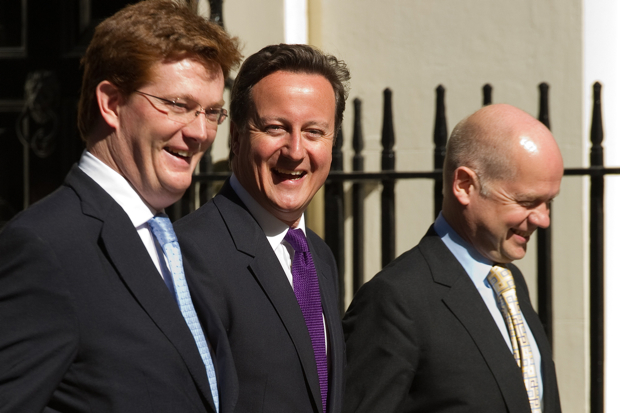If graduates from an architecture school designed buildings that were unfit for human habitation or doctors from a university’s medical faculty left death in their wake, their teachers would worry. The graduates of Oxford’s Politics, Philosophy and Economics course form the largest single component of the most despised generation of politicians since the Great Reform Act. Yet their old university does not show a twinge of concern.
Alex Salmond spat out ‘Westminster’ as if he meant ‘Babylon’, and every time he did, thousands of Scots decided to leave Britain. Ukip, a vehicle for another cynical demagogue, convinces its growing band of supporters that all politicians are liars (apart from Mr Farage, of course). Beyond party labels and nationalist sympathies is an ‘anti-politics mood’ that captures citizens of all beliefs and none (although ‘mood’ strikes me as too mild a world for the derision and the fury). Will Jennings of Southampton university pointed me to research which showed 80 per cent agreed with the proposition that ‘politicians are too focused on short-term chasing of headlines’, with just 3 per cent of respondents disagreeing. ‘You never see results like this,’ he said.
A remarkable number of the politicians voters despised for their tricks learnt their politics at Oxford: David Cameron, William Hague, Theresa May, Jeremy Hunt, Ed Davey, Danny Alexander. Matthew Hancock, Ed Miliband, David Miliband, Ed Balls, Yvette Cooper, Angela Eagle, Maria Eagle, Rachel Reeves and Stuart Wood. There are more PPE graduates in the Commons than Old Etonians (35 to 20). Remember I am not talking about Oxbridge-educated politicians, who make up 50 per cent of ministers and 28 per cent of MPs, but the graduates of just one Oxford course.
Ambitious young men and women now believe they must study politics at Oxford if they want to get on in politics. And not only ambitious Brits. Christopher Hood, the editor of the only academic study of PPE, says that at one point in the last decade 5 per cent of the world’s foreign ministers had enrolled at St Antony’s — Oxford’s postgraduate college for political studies. What Oxford teaches ought to be of more than academic interest.
The French keep a jaundiced eye on the énarques, the graduates of de Gaulle’s Ecole nationale d’administration, who always seem to end at the top of business in politics whoever is in power. In Britain, however, there is little beyond protest against the ‘private school Oxbridge elite’, which fails to understand that Oxford and Cambridge are meritocratic institutions, open to all qualified students regardless of parental wealth, while private schools most assuredly are not.
Occasionally, left-wing writers have noticed that the Oxford economics department sent its rosy-cheeked charges into a wicked world without a clue about the risks of a coming crash, but you could say the same about every economics department on the planet. As Oxford is a federal university with independent colleges, I cannot see how an academic or group of politics graduates could impose a party line. That you hear occasional complaints from the right as well convinces me that none exists. (One conservative editor hands PPE graduates a remedial right-wing reading list to bang ‘sound’ thinking into their misguided young minds.)
Oxford’s issue is not what it thinks but how it thinks.
Last week Vernon Bogdanor described his astonishment that the man he called ‘my ablest pupil’ (David Cameron, PPE, Brasenose College) was drawing up a new constitution on scrap paper. You don’t rush fundamental change with barely a moment’s thought, the visibly shaken Bogdanor told the BBC. Cameron’s behaviour was ‘absurd’.
As Professor Bogdanor’s least able pupil, I hate to be the one to break it to him, but banging out ideas with barely a moment’s thought is exactly what PPE students do. They study three separate disciplines yoked into one course. In the first year, they must produce essays on John Stuart Mill one minute and parliament the next; on microeconomics, modern French history, Rousseau, Marx, formal logic, the US Congress and whether it is better to be Socrates dissatisfied than a fool satisfied.
‘I always invited PPE-ists to my parties,’ said Madeline Grant, who left Oxford last year. ‘They could talk about anything. Whether they knew anything did not bother them in the slightest.’
I don’t dispute that Oxford produces world-class thinkers, but it also churns out world-class bullshitters. Career politicians with no interests outside politics have always existed, as the lives of Pitt the Younger, Lloyd George and Asquith show. More novel, or more common than they once were, are politicians who believe that governing is managing; that the tactics of Peter Mandelson (PPE, St Catherine’s College) are all they need to know: lead the news cycle, write the headlines, buy off Murdoch, offer a concession to anti-immigrant feeling here, a tax-raising power to Scots there, then wait for the next wave to surf.
PPE essay crises are the perfect preparation for politicians who will distil a complicated society down to a few slogans — ‘It’s the economy, stupid’ — and confine their reading to the handful of texts that impress their peers: Caro on Lyndon Johnson, Thaler on nudging. Above all, the flightiness of PPE encourages puppeteer politicians, who stand above their society pulling the strings, rather than men and women who represent solid interests within it.
If Oxford will not split the course into separate subjects to encourage serious study, there is one small reform it could implement in compensation. It offers students the option of producing a 10,000-word dissertation. The study must be original research, and students must have a genuine interest to see them through the hard work ahead. Several told me that they and their contemporaries refused to write dissertations for these very reasons. Could not Oxford make the option compulsory and force students to concentrate on one hard topic, if only for a few months? Would it not then produce politicians who were more likely to root themselves in their country rather than skim its surface like pond-skating insects?
Got something to add? Join the discussion and comment below.
Get 10 issues for just $10
Subscribe to The Spectator Australia today for the next 10 magazine issues, plus full online access, for just $10.
Nick Cohen is a Spectator blogger, Observer columnist and author of several books.
You might disagree with half of it, but you’ll enjoy reading all of it. Try your first month for free, then just $2 a week for the remainder of your first year.















Comments
Don't miss out
Join the conversation with other Spectator Australia readers. Subscribe to leave a comment.
SUBSCRIBEAlready a subscriber? Log in